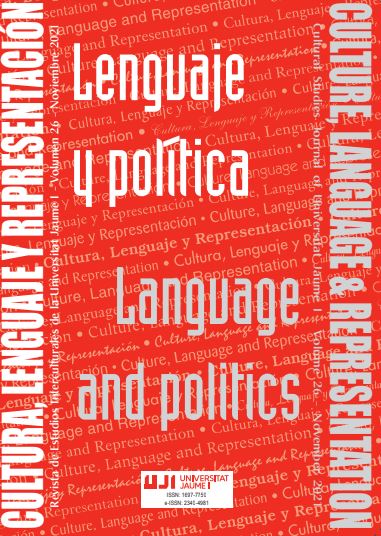Nuevos líderes, ¿nuevos discursos? El discurso en twitter de Andrés Arauz durante la campaña electoral de Ecuador (2021)
Main Article Content
Abstract
The emergence of social media has come to modify not only the habits of information consumption, but also the political and electoral processes themselves. In this framework, and taking into account the very characteristics of digital information, political speeches have also been affected by having to adapt to new formats. All this, in a context of increasing personalization of politics and, furthermore, in a period in which populist leaderships coexist with other emerging ones. In this paper we carry out an analysis of the speech of the presidential candidate Andrés Arauz on social media (twitter) during the Ecuadorian elections of 2021. This allows us to identify if the new and young leader of the correísta movement shares the populist features of his predecessor and, in addition, to know what the characteristics that build his speech. The results show that Arauz discourse has no populist traits and that it is characterized by having a sophisticated tone, constructed from three fields: hope, campaign proposals and political crisis.
Downloads
Article Details
An open-access CREATIVE COMMONS copyright license is used. Those authors whose works are published by this journal, accept the following terms:
- Authors will retain their copyright and guarantee the Journal the right to first publish their work, which will simultaneously be subject to the Creative Commons Recognition License CC BY SA that allows third parties to share the work, provided that its author and first publication is indicated.
- Authors may adopt other non-exclusive license agreements for the distribution of the published version of the work (e.g., deposit it in an institutional telematics file or publish it in a monographic volume) provided that the initial publication in this journal is indicated.
- Authors are allowed and recommended to disseminate their work over the Internet (e.g. in institutional telematics files or on their website) before and during the submission process, which can produce interesting exchanges and increase quotes of the published work.
References
Bouza, Fermín. 2007. «Populismo y Medios de Comunicación». Ponencia presentada en el seminario Populismo. Centro de Cultura Contemporánea de Barcelona. Barcelona (España), 16-17 abril 2007.
Canel, María José.1998. «Los efectos de las campañas electorales». Comunicación y sociedad, 11(1): 47–67.
Carsten Reinemann, Toril Aalberg, Frank Esser, Jesper Strömbäck, and Claes H. de Vreese. 2016. «Populist Political Communication Toward a Model of Its Causes, Forms, and Effects». En Toril Aalberg, Frank Esser, Carsten Reinemann, Jesper Strömbäck, Claes H. de Vreese (ed). Populist Political Communication in Europe. (pp.12–25). Routledge.
Cotarelo, Ramón. 2012. «La expansión de la ciberpolítica», en Colino, C. Y Cotarelo, R. (eds) España en crisis. Valencia: Tirant lo Blanch.
Charaudeau, Patrick. 2009. «Análisis del discurso e interdisciplinariedad en las ciencias humanas y sociales». El discurso y sus espejos. México: Universidad Nacional Autónoma de México.
D’Alessandro, Martín. 2004. «¿Qué es la personalización de la política? Algunos hallazgos en los medios gráficos, 1983-1995». Revista Argentina de Ciencia Política, 7-8: 73-94.
D'Alessandro, Martín. 2006. «Liderazgo político », en Luis Aznar y Miguel De Luca (comps.) Política. Cuestiones y problemas. Buenos Aires: Ariel.
De la Torre, Carlos. 2012. «Rafael Correa, un Populista del Siglo XXI». En Cheresky, Isidoro (ed.), ¿Qué Democracia en América Latina?. Buenos Aires: CLACSO / Prometeo, 251281.
De la Torre, Carlos. 201. «El Populismo Latinoamericano: Entre la Democratización y el Autoritarismo». Nueva Sociedad, 247: 120137.
De Vreese, Claes. 2004. «The effects of frames in political television news on issue interpretation and frame salience». Journalism & Mass Communication Quarterly, 81 (1): 36-52.
Deiwiks, Christa. 2009. Populism. Living Reviews in Democracy 1: 19.
Freidenberg, Flavia. 2012. «El Flautista de Hammelin: liderazgo y populismo en la democracia ecuatoriana». En Peruzzotti, E. y De la Torre, C (ed). El retorno del pueblo. Quito: FLACSO Ecuador.
Freidenberg, Flavia, Pachano, Simón. 2016. El sistema político ecuatoriano. Quito: FLACSO.
García Beaudoux, Virginia y D’Adamo, Orlando. 2004. «Campañas electorales y sus efectos sobre el voto. Análisis de la campaña electoral presidencial 2003 en Argentina». Psicología Política, 28: 7-25.
Gitlin, Todd. 1991. «Blips, bytes and savy talk: television’s impact on American Politics». En Dahlgren, P. y Sparks, C. (ed). Communication and citizenship. Boston: Routledge.
Hermet, Guy. 2003. «El Populismo como Concepto». Revista de Ciencia Política 23/1, 518.
Jagers, Jan, y Walgrave, Stefaan. 2007. «Populism as political communication style: An empirical study of political parties’ discourse in Belgium». European Journal of Political Research, 46(3): 319–345.
Laclau, Ernesto. 2005a. La Razón Populista. Buenos Aires: Fondo de Cultura Económica.
Laclau, Ernesto. 2005b. «La Deriva Populista y la Centroizquierda Latinoamericana». Nueva Sociedad, 205: 5661.
Martínez i Coma, Ferrán. 2008. «¿Cuáles fueron los efectos de la campaña electoral española del 2000?». REIS, 112/05: 231-257.
Mazzoleni, Gianpetro y Schulz, Winfried. 1999. «Mediatization of Politics: A Challenge for Democracy? ». Political Communication, 16 (3): 247-261.
Muñoz Alonso, Alejandro y Rospir, Juan Ignacio. 1995. Comunicación Política. Madrid: Ed. Universitas.
Ortega, Félix. 2011. La Política Mediatizada. Madrid: Alianza.
Paletz, David. 1997. «Campañas y elecciones». CIC, 3: 205-227.
Papacharissi, Zizi. 2002. «The virtual sphere». New media and society, 4 (1): 9-27.
Petracca, Orazio. 1997. «Liderazgo», en Bobbio, Norberto; Matteucci, Nicola y Pasquino, Gianfranco (dirs.), Diccionario de política, México D.F.: Siglo XXI. [Dizionario di politica, 1976.]
Strömbäck, Jesper. 2008. «Four phases of mediatization of politics». The International Journal of Press/Politics, 13(3): 228-246.
Vallés, Josep María. 2010. «Política democrática y comunicación: un rapto consentido». Revista de Estudios Políticos, 150: 11-50.
Van Dijk, Teun. 2009. Discurso y Poder. Barcelona: Editorial Gedisa.
Van Dijk, Teun. 2005. «Política, ideología y discurso». QUÓRUM ACADÉMICO, 2 (2): 15 – 47.
Van Dijk, Teun 1999. «El Análisis Crítico del Discurso». Anthropos, 186: 2336.
Yang, Xinxing., Chen, Bo-Chiuan., Maity, Mrinmoy. y Ferrara, Emilio. 2016. «Social politics: agenda setting and political communication on social media. En International conference on social informatics». Springer. PP: 330-344.


